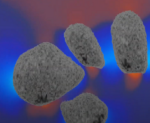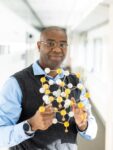Following the news last week of her departure as director of the U.S. Department of Energy’s Office of Science since May 2022, Dr. Asmeret Asefaw Berhe has issued a letter of farewell to her agency and White House colleagues. Dr. Berhe is currently on leave from the….
Asmeret Asefaw Berhe Issues Letter of Farewell as Director of DOE Office of Science
DOE $36M Funding Opportunity: AI for Science
Feb. 13, 2024: The U.S. Department of Energy’s Office of Science, Advanced Scientific Computing Research (ASCR) program, is issuing a $36 million funding opportunity announcement for basic computer science and applied mathematics research in the fundamentals of artificial intelligence (AI) for science. Deadline for letters of intent: Tuesday, March 19, 5 pm ET. Deadline for […]
Dr. Ceren Susut Named DOE ASCR Associate Director of Science
Dr. Ceren Susut has been named associate director (AD) of Science for Advanced Scientific Computing Research (ASCR) in the Department of Energy Office of Science (SC). Dr. Susut has served in ASCR for more than 12 years as a program manager, the director for ASCR’s Computational Science Research and Partnerships Division, and most recently as….
ASCR: Exascale to Burst Bubbles that Block Carbon Capture
Bubbles could block a promising technology that would separate carbon dioxide from industrial emissions, capturing the greenhouse gas before it contributes to climate change. A team of researchers with backing from the Department of Energy’s Exascale Computing Project (ECP) is out to burst the barrier, using a code that captures the floating blisters and provides insights to deter them. Chemical looping reactors (CLRs) combine fuels such as methane with oxygen from metal oxide particles before combustion. The reaction produces water vapor and carbon dioxide, which can easily be separated to create a pure CO2 stream for sequestration or industrial use. Standard post-combustion separation must pull carbon dioxide from a multigas mixture.
Valentino Cooper Appointed to DOE’s Basic Energy Sciences Advisory Committee
April 25, 2023 — Valentino “Tino” Cooper, a scientist at the Department of Energy’s Oak Ridge National Laboratory, has been appointed to DOE’s Basic Energy Sciences Advisory Committee for a three-year term. Cooper’s research elucidates the fundamental understanding of advanced materials for next-generation energy and information technologies. The BESAC provides advice and recommendations on complex […]
DOE Seeks Proposals from National Labs for ‘High Performance Data Facility’
March 10, 2023 — Today, the U.S. Department of Energy (DOE) announced a call for proposals to lead the High Performance Data Facility, a project to create a new scientific user facility specializing in advanced infrastructure for data-intensive science. The competition to lead the High Performance Data Facility is open to the Office of Science national laboratories. […]
DOE Announces $12M Quantum Testbed Funding Opportunity
March 1, 2023 — The Department of Energy’s (DOE) Office of Advanced Scientific Computing Research (ASCR) has announced a $12 million quantum testbed funding opportunity. Agency contacts and more details, including eligibility and application information can be found here. The deadline for letters of intent is Friday, March 31, 2023 at 5 pm ET. The […]
DOE: $56M for Traineeships Supporting Historically Underrepresented Groups and Institutions
Jan. 9, 2023 — Today, the U.S. Department of Energy (DOE) announced $56 million to provide research opportunities to historically underrepresented groups and institutions in STEM. The funding, through the DOE Office of Science’s Reaching a New Energy Sciences Workforce (RENEW) initiative, will support internships, mentorship, and training programs at Historically Black Colleges and Universities (HBCUs), […]
DOE Office of Science Announces $400M in Research Funding Opportunities
Oct. 4, 2022 — The U.S. Department of Energy (DOE) today announced an up to $400 million funding opportunity for basic research in support of DOE’s clean energy, economic, and national security goals. The funding will target the priorities of DOE’s Office of Science, including Advanced Scientific Computing Research, basic energy sciences, biological and environmental […]









